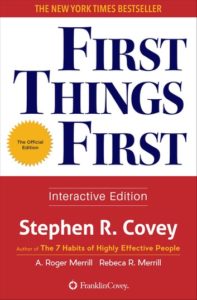We are all at different places in our lives. For some, school is just started. After the mad dash of collecting school supplies, we’re now back into a routine of getting children to sleep on “school-nights,” getting them up at earlier hours, and making sure that they have completed their homework.
Others have different concerns. A lady I work with is getting ready to have her first child. If you have children, you know what a game-changer the first one is. I can hardly remember life before children. All I can tell you is that all of my priorities shifted and life was turned upside down.
I have another friend who just became a mortgage broker. He’s working extra hours for less pay until he can get to the place where he does not have to hustle so much to get the work to flow in. He knows that he will not have to work at such a rigorous pace all the time, but right now, his wife is upset by how much he has to work.
In all of these scenarios, life is out of balance. The good news is that it is OK as long as it is only for a season.
Eventually, we will get back into the rhythm of the school year and life will feel normal again. Eventually that baby will come, and when she does, the temptation is to expect things to go right back to normal. The truth is that they will not for some time and that is OK too—as long as you recognize that this is only for a season.
In First Things First, Stephen Covey wrote:
My daughter Maria, who recently had her third child, was talking with me one evening. She said, “I’m so frustrated, dad! You know how much I love this baby, but she is literally taking all my time. I’m just not getting anything else done, including many things that only I can do.”
I could understand how this was frustrating to her. Maria is bright and capable, and she’s always been involved in many good things. She was feeling pulled by good things—projects she wanted to accomplish, contributions she wanted to make, things around the house that weren’t getting done.
As we talked, we came to the realization that her frustration was essentially a result of her expectations. And for now, only one thing was needful—enjoying that baby”
“Just relax,” I said. “Relax and enjoy the nature of this new experience. Let this infant feel your joy in the role of mother. No one else can love and nurture that child the way you can. All other interests pale in comparison for now.”
Maria realized that, in the short run, her life was going to be imbalanced… and that it should be. “There is a time and a season for everything under the sun.” She also realized that as the baby grew and entered a different phase in life, she would be able to reach her goals and contributed other powerful ways.
Finally, I said, “don’t even keep a schedule. Forget your calendar. Stop using your planning tools if they only induce guilt. This baby is the first thing in your life right now. Just enjoy the baby and don’t worry. Be governed by your internal compass, not some clock on the wall.”[1]
That’s powerful advice coming from the guy that literally developed one of the best-selling time management devices of all time—the Franklin-Covey planner.
The beauty of his advice is in the context. He wasn’t telling her to be lazy. He wasn’t telling her to give up. He was telling her to do the appropriate thing in the appropriate season.
Right now, my friend the mortgage broker has to hustle. This is the appropriate thing in the appropriate season. His situation brings to mind a great line from Rory Vaden’s book, Procrastinate on Purpose. He is following a strategy of, “working double time part-time for full-time free time.”[2]
If he works in overdrive for a season, he will be able to downshift later. Life is out of balance now, but hard work on the front end can mean balance later. He has to be discerning enough to understand that he can’t live like this perpetually or he’ll burn out. But he also has to know that for now, he has to work in overdrive if he’s ever to achieve balance.
What About You?
Is life out of balance? What do you need to do during this season? What will you have to do to bring life back into balance?
References
[1] Covey, S. M., Merrill, A. R., & Merrill, R.R. (1994). First things first. New York: Fireside.
[2] Vaden, R. (2015). Procrastinate on Purpose. New York: Perigee.
___________

Dr. Darin Gerdes is a tenured Professor of Management in the College of Business at Charleston Southern University.
All ideas expressed on www.daringerdes.com are his own.
This post was originally created for Great Business Networking (GBN), a networking organization for business professionals where Dr. Gerdes is the Director of Education.
___________


